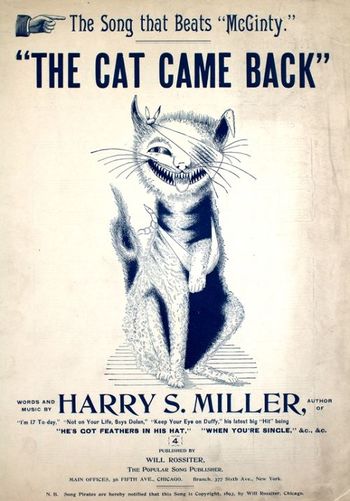Annotation:Cat Came Back (And the): Difference between revisions
No edit summary |
No edit summary |
||
| (13 intermediate revisions by the same user not shown) | |||
| Line 2: | Line 2: | ||
{{TuneAnnotation | {{TuneAnnotation | ||
|f_tune_annotation_title=https://tunearch.org/wiki/Annotation:Cat_Came_Back_(And_the) > | |f_tune_annotation_title=https://tunearch.org/wiki/Annotation:Cat_Came_Back_(And_the) > | ||
|f_annotation='''(AND THE) CAT CAME BACK'''. American, Reel (2/4 or cut time). G Major. Standard tuning (fiddle). AABB ('''Devil's Box'''). Christeson (1973) notes: "Played by a few Missouri fiddlers in ... the early 1930's but is seldom heard any more." The tune was actually a Tin-Pan-Alley song from | |f_annotation='''(AND THE) CAT CAME BACK'''. American, Reel (2/4 or cut time). G Major. Standard tuning (fiddle). AABB ('''Devil's Box'''). Christeson (1973) notes: "Played by a few Missouri fiddlers in ... the early 1930's but is seldom heard any more." The tune was actually a Tin-Pan-Alley song from Christmas, 1893, written by prolific songwriter [[wikipedia:Harry_S._Miller]] and popularized by New York entertainer and Broadway impresario [[wikipedia:Tony_Pastor]]. The song entered folk tradition and there are numerous verses and variations of the lyric, but the stable chorus goes:[[File:Catcameback.jpg|right|350px|thumb|]] | ||
|f_source_for_notated_version=Doc Roberts (Ky.) [Reiner & Anick]; Kevin Wimmer [Phillips]. | <blockquote> | ||
|f_printed_sources=R.P. Christeson ('''Old Time Fiddlers Repertory, vol. 1'''), 1973; p. 8. Stephen F. Davis ('''The Devil's Box''', vol. 13, No. 4, Dec. 1979; p. 32. | ''But the cat came back, he couldn't stay no longer,''<br> | ||
Phillips ('''Traditional American Fiddle Tunes, vol. 1'''), 1994; p. 15. | ''Yes the cat came back de very next day,''<br> | ||
''the cat came back—thought she were a goner,''<br> | |||
''But the cat came back for it wouldn't stay away.''<br> | |||
</blockquote> | |||
It was popularized among country musicians in the early 78 RPM era through recordings by north Georgia's [[wikipedia:Fiddlin'_John_Carson]] and [[wikipedia:Riley_Puckett]], and by Kentucky's [[wikipedia:Fiddlin'_Doc_Roberts]]. It was later recorded by fiddler [[wikipedia:Tommy_Jackson_(musician)]], and (late in his career) [[wikipedia:Clark_Kessinger]]. | |||
|f_source_for_notated_version=Doc Roberts (Ky.) [Milliner & Koken, Reiner & Anick]; Kevin Wimmer [Phillips]. | |||
|f_printed_sources=R.P. Christeson ('''Old Time Fiddlers Repertory, vol. 1'''), 1973; p. 8. Stephen F. Davis ('''The Devil's Box''', vol. 13, No. 4, Dec. 1979; p. 32. Clare Milliner & Walt Koken ('''Milliner-Koken Collection of American Fiddle Tunes'''), 2011; p. 8. Phillips ('''Traditional American Fiddle Tunes, vol. 1'''), 1994; p. 15. | |||
Reiner & Anick ('''Old-Time Fiddling Across America'''), 1989; p. 98. | Reiner & Anick ('''Old-Time Fiddling Across America'''), 1989; p. 98. | ||
|f_recorded_sources=Marimac AHS #3, Glen Smith – "Say Old Man" (1990. Learned from Tommy Jackson). | |f_recorded_sources= Challenge 307 (78 RPM), Fiddlin' Doc Roberts (1927). Decca 5442 (78 RPM), Riley Puckett (1937). Document DOCD 8042, "Fiddlin' Doc Roberts; Complete Recorded Works, vol. 1, 1925-1928," (1999). Dot Records 45-235 (45 RPM), Tommy Jackson (1955). Marimac AHS #3, Glen Smith – "Say Old Man" (1990. Learned from Tommy Jackson). OKeh Records 40119 (78 RPM), Fiddlin' John Carson (1924). | ||
Morning Star 45005, Doc Roberts – "Way Down South in Dixie" (Learned from Madison County, Ky., African-American fiddler Owen Walker {b. 1857), a well-known local entertainer). | Morning Star 45005, Doc Roberts – "Way Down South in Dixie" (Learned from Madison County, Ky., African-American fiddler Owen Walker {b. 1857), a well-known local entertainer). | ||
|f_see_also_listing= | |f_see_also_listing=Hear Doc Roberts' 1927 recording at Slippery Hill [https://www.slippery-hill.com/content/and-cat-came-back]<br> | ||
}} | }} | ||
------------- | ------------- | ||
Latest revision as of 04:36, 4 July 2022
X:1 T:Cat Came Back, The M:2/4 L:1/8 K:A f/g/|a/b/a/f/ ec|a/g/a/e/ fe|a/b/a/f/ ea/e/|g/a/b/g/ a/e/f/g/| a/b/a/f/ ec|a/g/a/e/ fe|a/b/a/f/ ea|g/a/b/g/ a:| |:c/d/|ea a/g/a/b/ c' c'/b/ c'c'/b/|c'c'/b/ c'/b/a/g/|(e2 e) c/B/| c(f f/)e/c/B/|[c2e2] e2|c>B [c/e/][A/e/][B/e/][B/e/]|[A2e2]-[Ae]|| |:E/F/|AA c/d/e/c/|dc e/d/c/B/|AA c/ec/|d/c/B/A/ E/G/B/G/| AA/B/ c/d/e/c/|d/c/d/e/ fe|f/e/f/g/ a/f/e/d/|[c/e/][A/e/][B/e/][c/e/] [Ae]:||

But the cat came back, he couldn't stay no longer,
Yes the cat came back de very next day,
the cat came back—thought she were a goner,
But the cat came back for it wouldn't stay away.
It was popularized among country musicians in the early 78 RPM era through recordings by north Georgia's wikipedia:Fiddlin'_John_Carson and wikipedia:Riley_Puckett, and by Kentucky's wikipedia:Fiddlin'_Doc_Roberts. It was later recorded by fiddler wikipedia:Tommy_Jackson_(musician), and (late in his career) wikipedia:Clark_Kessinger.

